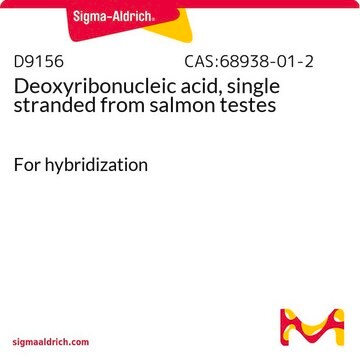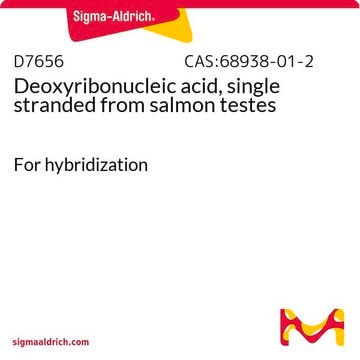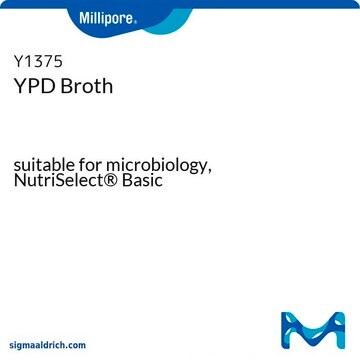YEAST1
Yeast Transformation Kit
reagents for introducing plasmid DNA into yeast
Sinónimos:
lithium acetate yeast transformation
About This Item
Productos recomendados
grade
for molecular biology
Quality Level
usage
kit sufficient for >100 standard transformations
technique(s)
transformation: suitable
shipped in
dry ice
storage temp.
−20°C
Categorías relacionadas
General description
Application
Features and Benefits
- Easy and ready-to-use
- Requires as little as 10 ng of plasmid DNA
- Flexibility for any strain of yeast
- Sufficient for over 100 standard transformations
Components
- Transformation Buffer; 100 ml; 100 mM lithium acetate, 10 mM Tris HCl, pH 7.6, and 1 mM EDTA
- Plate Buffer; 100 ml; 40% PEG, 100 mM lithium acetate, 10 mM Tris HCl, pH 7.5, 1 mM EDTA
- Deoxyribonucleic acid from salmon teste, 10 mg/ml; 2 x 1 ml
- Control Yeast Plasmid DNA pRS316 carrying the ura gene; 10 μg
- Yeast Synthetic Drop-out Medium Supplement Without Uracil; 1 g
Principle
related product
Storage Class
10 - Combustible liquids
flash_point_f
Not applicable
flash_point_c
Not applicable
Certificados de análisis (COA)
Busque Certificados de análisis (COA) introduciendo el número de lote del producto. Los números de lote se encuentran en la etiqueta del producto después de las palabras «Lot» o «Batch»
¿Ya tiene este producto?
Encuentre la documentación para los productos que ha comprado recientemente en la Biblioteca de documentos.
Los clientes también vieron
Artículos
Transformation introduces exogenous DNA into cells, a fundamental genetic modification process demonstrated in Streptococcus pneumoniae.
Transformation introduces exogenous DNA into cells, a fundamental genetic modification process demonstrated in Streptococcus pneumoniae.
Transformation introduces exogenous DNA into cells, a fundamental genetic modification process demonstrated in Streptococcus pneumoniae.
Transformation introduces exogenous DNA into cells, a fundamental genetic modification process demonstrated in Streptococcus pneumoniae.
Protocolos
The selection of plasmids in yeast is based on the use of auxotrophic mutant strains, which cannot grow without a specific medium component (an amino acid, purine, or pyrimidine)
Yeasts are considered model systems for eukaryotic studies as they exhibit fast growth and have dispersed cells.
Nuestro equipo de científicos tiene experiencia en todas las áreas de investigación: Ciencias de la vida, Ciencia de los materiales, Síntesis química, Cromatografía, Analítica y muchas otras.
Póngase en contacto con el Servicio técnico









